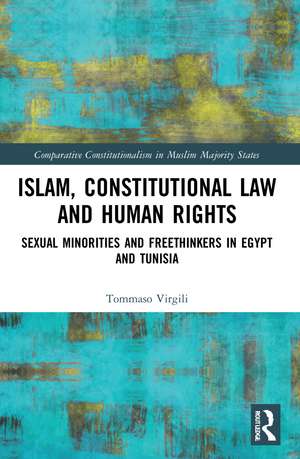Islam, Constitutional Law and Human Rights: Sexual Minorities And Freethinkers In Egypt And Tunisia: Comparative Constitutionalism in Muslim Majority States
Autor Tommaso Virgilien Limba Engleză Paperback – 31 mai 2023
Part I provides a theoretical account of the conception of constitutionalism and human rights in Islam, compared and contrasted with Western constitutionalism. A set of issues where the tension between shariᶜa and human rights is accentuated is analysed against the backdrop of the main Islamic charters of rights. Part II conducts a similar assessment based on the Constitutions of Tunisia and Egypt – the two main epicentres of the Arab Spring. Part III moves to two specific rights in the same countries, from the twofold perspective of the Constitutions and international law: the freedom from interference in one’s intimate life, with particular regard to homosexuality; and the freedom of holding and expressing nonconventional beliefs, deemed unacceptable from the point of view of traditional Islam. These issues have been chosen as representative of the most controversial, still considered taboo in both legal and social terms, hence at the fringes of the debate on individual freedoms. Focusing on two overlooked and underexplored issues, the work thus pushes the boundaries of the human rights discourse in Muslim contexts.
| Toate formatele și edițiile | Preț | Express |
|---|---|---|
| Paperback (1) | 325.30 lei 3-5 săpt. | +18.31 lei 7-13 zile |
| Taylor & Francis – 31 mai 2023 | 325.30 lei 3-5 săpt. | +18.31 lei 7-13 zile |
| Hardback (1) | 1000.27 lei 6-8 săpt. | |
| Taylor & Francis – 16 sep 2021 | 1000.27 lei 6-8 săpt. |
Preț: 325.30 lei
Nou
Puncte Express: 488
Preț estimativ în valută:
62.24€ • 64.99$ • 51.52£
62.24€ • 64.99$ • 51.52£
Carte disponibilă
Livrare economică 15-29 martie
Livrare express 01-07 martie pentru 28.30 lei
Preluare comenzi: 021 569.72.76
Specificații
ISBN-13: 9781032051260
ISBN-10: 1032051264
Pagini: 210
Dimensiuni: 156 x 234 x 15 mm
Greutate: 0.34 kg
Ediția:1
Editura: Taylor & Francis
Colecția Routledge
Seria Comparative Constitutionalism in Muslim Majority States
Locul publicării:Oxford, United Kingdom
ISBN-10: 1032051264
Pagini: 210
Dimensiuni: 156 x 234 x 15 mm
Greutate: 0.34 kg
Ediția:1
Editura: Taylor & Francis
Colecția Routledge
Seria Comparative Constitutionalism in Muslim Majority States
Locul publicării:Oxford, United Kingdom
Public țintă
PostgraduateCuprins
Foreword, Brian Whitaker
Chapter I Constitutionalism And Islam
Chapter II The Islamic Conception Of Individual Liberties
Chapter III What "ShariᶜA" In A Constitution Concretely Means: The Case Of Egypt
Chapter IV Islamic Law In Post-Arab Spring Egyptian Constitutions
Chapter V Compromises And Ambiguities In The 2014 Tunisian Constitution
Chapter VI (Il)Legal Persecution Of Freethinkers
Final Reflections On Egyptian And Tunisian Freethinkers: Public Order And Fitna
Chapter VII (Il)Legal Persecution Of Sexual Minorities
Chapter VIII Constitutional And International Freedoms
Conclusions Constitutions And Individual Freedom: The Unbreakable Bond
Chapter I Constitutionalism And Islam
Chapter II The Islamic Conception Of Individual Liberties
Chapter III What "ShariᶜA" In A Constitution Concretely Means: The Case Of Egypt
Chapter IV Islamic Law In Post-Arab Spring Egyptian Constitutions
Chapter V Compromises And Ambiguities In The 2014 Tunisian Constitution
Chapter VI (Il)Legal Persecution Of Freethinkers
Final Reflections On Egyptian And Tunisian Freethinkers: Public Order And Fitna
Chapter VII (Il)Legal Persecution Of Sexual Minorities
Chapter VIII Constitutional And International Freedoms
Conclusions Constitutions And Individual Freedom: The Unbreakable Bond
Notă biografică
Tommaso Virgili is a Postdoctoral Research Fellow at the WZB Berlin Social Science Center, where he works on modernization movements and reform theology within Islam in response to the challenge of fundamentalism, with a focus on Europe and the MENA region. He received his Ph.D. in Comparative Public Law from Sant’Anna School of Advanced Studies in Pisa, Italy. Dr. Virgili is also a Research Associate at the Wilfried Martens Centre for European Studies and a Visiting Fellow at the European Foundation for Democracy in Brussels.
Descriere
This book focuses on Islamic constitutionalism, and in particular on the relation between religion and the protection of individual liberties potentially clashing with shariᶜa and the Islamic ethos.


